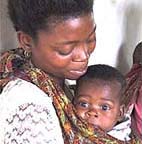|
||||

|
|
|||||||
|
December 2001 Return to December 2001 contents page NEWS Malaria vaccine moves ahead A CANDIDATE vaccine that provides partial protection against malaria is to start trials in children in Mozambique next year. The announcement, from the international Malaria Vaccine Initiative at PATH(1) and the vaccine's developer GlaxoSmithKline, came this month as researchers reported that the vaccine reduced rates of infection in a group of adults in a trial in The Gambia(2).
Malaria vaccines are notoriously difficult to develop, partly because the malaria parasite, Plasmodium falciparum, has a complex life cycle and presents different faces to the immune system. For malaria-endemic areas, scientists believe it will be important for vaccines to block infection by the parasite rather than merely reducing the symptoms of the disease. To do this, a vaccine needs to target the immature form of the parasite, the sporozoite, which enters the bloodstream from the bite of an infected mosquito. RTS,S/AS02 is made with a protein from the sporozoite, fused to the harmless surface antigen from the hepatitis B virus. In The Gambia, the vaccine protected 71% of men from infection in the first nine weeks after it was given, although protection waned to zero by sixteen weeks. Overall, the vaccine's efficacy over the period of the trial was 34%. The MVI project aims to increase the duration of protection and the efficacy of the vaccine. Although GAVI will support some research and development, malaria vaccines are not currently receiving Alliance support because other players are funding them. The Alliance will instead focus its R&D resources on a limited number of products and technologies that are very close to market, such as vaccines against meningitis A, pneumococcus and rotavirus. But the Alliance considers the development of malaria vaccines to be a high priority for global health and its partners have welcomed the international support for the Mozambique trials of RTS,S/AS02. References (1) http://malariavaccines.org/files/MVI-GSK-CISM-011205.htm (2) Bojang K. et al. Efficacy of RTS,S/AS02 malaria vaccine against Plasmodium falciparum infection in semi-immune adult men in The Gambia: a randomised trial. The Lancet, 2001; 358: 1927-34. Free access for this paper at http://www.thelancet.com
Phyllida Brown
Return to December 2001 contents page
|
|||||||
| Contact GAVI | Guestbook | Text version | Credits and Copyright
|
|||||||
